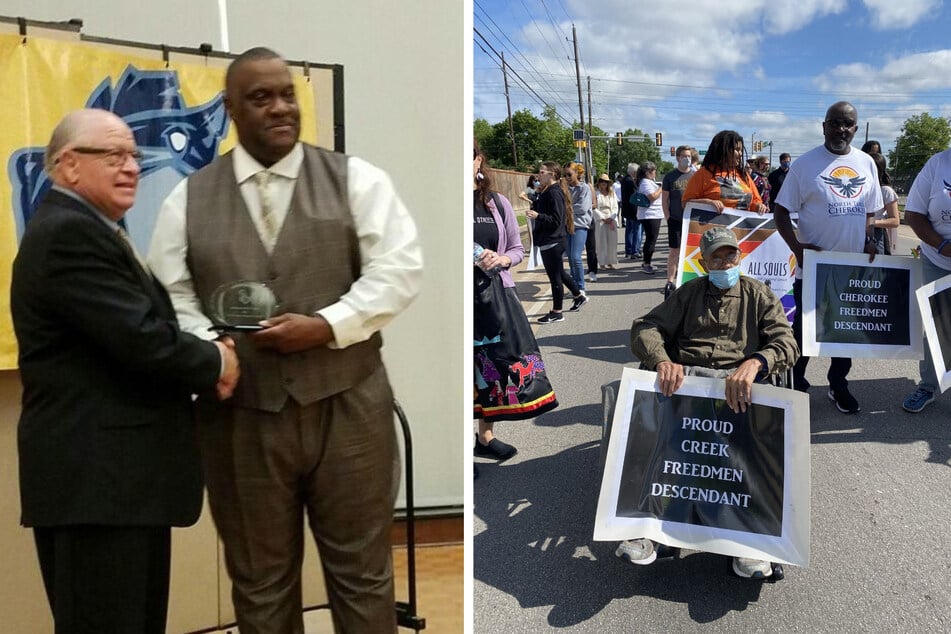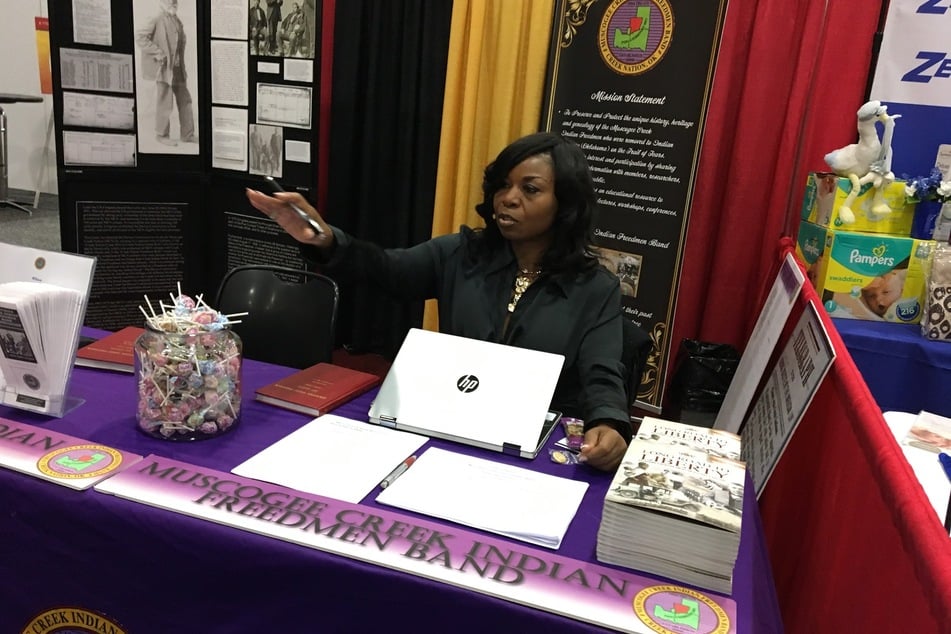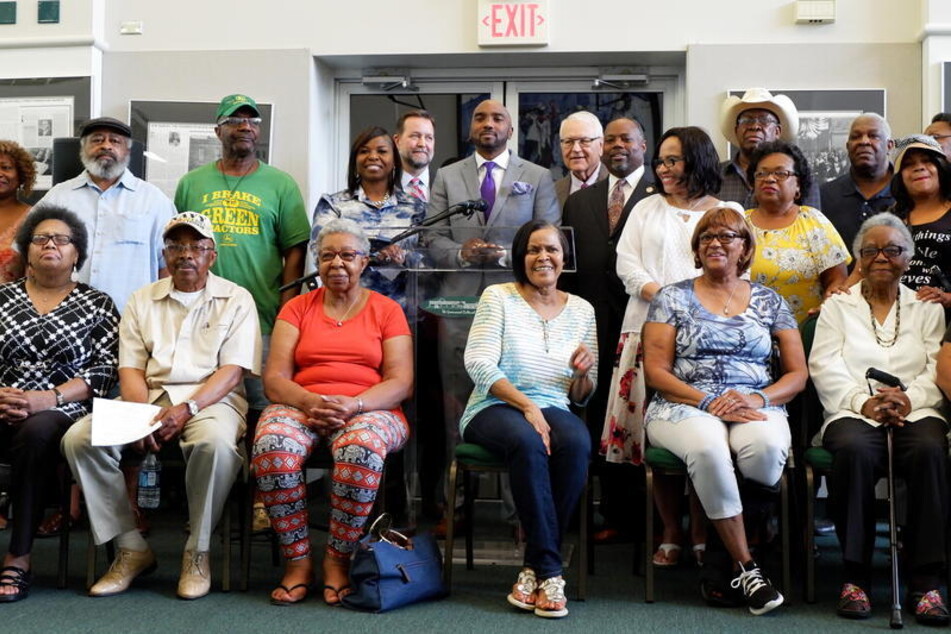Black Creeks speak out ahead of historic hearing on tribal citizenship rights
Tulsa, Oklahoma - Black Creeks, descendants of the Muscogee Creek Freedmen, are preparing for a historic court hearing on December 1 as they seek to reclaim their tribal citizenship rights in the Creek Nation.

Muscogee Creek Freedmen were members of the Muscogee Creek Nation (MCN) of African descent who were either enslaved by citizens of the MCN, lived among the MCN as free Blacks, or were listed on the Dawes Rolls as interracial Creeks.
Article 2 of the Creek Treaty of 1866 guaranteed that the Freedmen and their descendants "shall have and enjoy all the rights of native citizens." Black Creeks, who suffered through the Trail of Tears and fought alongside their Indigenous counterparts in times of war, were considered equal members of the Creek Nation – until leadership suddenly stripped them of their citizenship rights in 1979.
The previous constitution of 1867, which adopted the provisions in the 1866 treaty, safeguarded Black Creeks' right to vote on tribal matters. Nevertheless, many were barred from participating when the 1979 constitution was put before the membership, according to the Muscogee Creek Indian Freedmen Band (MCIFB).
The results of the 1979 decision have been devastating, costing Black Creeks their sense of identity, voting rights, and ability to run for political office as well as access to federally funded programs like housing grants, educational grants, Covid relief, and more.
"After disenfranchisement in 1979, while at Oklahoma State University, I needed assistance for tuition, books, etc.," Ben Young, a 67-year-old native of Ponca City, Oklahoma, who traces his Creek roots to the 1800s, recalled to TAG24 NEWS. "This is one of the benefits the Creek Nation provided and then denied. After researching the 1866 treaty, article 2, they owe us!"
MCIFB Chairwoman Rhonda Grayson, based in Oklahoma City, said, "My soul is not at rest because I don’t believe the ancestors are at rest. Many of us have been advocating for our Treaty Rights for many years. It has been an uphill journey, one that we would like to see end on December 1."
"The removal has impacted us in many ways; for one, it has stripped us of our birthright, culture, language, and kinship," she continued. "We have spent countless hours advocating for the rights of the Creek Freedmen, not only our time but also our financial resources."
Muscogee Creek Freedmen and their legacy

The legacy of the Muscogee Creek Freedmen is inseparable from that of the Creek Nation and the state of Oklahoma.
"The Creek Nation would not be what it is today without the contributions of the Black Creeks. The people known as Creek Freedmen served in the House of Kings and the House of Warriors," Grayson said. "They served as senators, judges, lawyers, Lighthorse police, and the principal chief of the Creek Nation."
The Freedmen also played a central part in Oklahoma's history of Black resilience, including in the foundation of Tulsa's Greenwood district. The neighborhood, known as Black Wall Street, served as a beacon of Black success in spite of rigid racist oppression until it was nearly eviscerated by a white-supremacist mob in 1921 in the Tulsa Race Massacre.
"Sadly, these leaders played important roles in history, only to be removed from the Nation of their birth in 1979," Grayson lamented. "These formally enslaved people had committed no treason. They served side by side with the Muscogee people during the time of war and enjoyed full citizenship in the Nation due to generations of accrued culture, language, intermarriage, the production of offspring, and the Treaty of 1866 – until Freedmen were forced out of the Nation in the alleged name of 'blood' and 'sovereignty.'"
"That same resilience and perseverance keep their descendants fighting the good fight every day until victory is won."
Black Creeks seek "redemption" through legal action

Now, Black Creeks are taking their fight for citizenship rights to the courts. Their lawsuit accuses the MCN Citizenship Board of violating the Treaty of 1866, the US Constitution, the Principal Chiefs Act of 1970, and the Indian Civil Rights Act.
A win would not only restore the benefits they once received, but also affirm Black Creeks' identity as full members of the MCN. As Grayson put it, "It would mean redemption for our ancestors, the descendants, and me. Our citizenship rights were taken away in 1979 unlawfully; we were citizens, and technically still are citizens, as the Treaty has not been abrogated."
"Redemption means calling the ancestors by name, acknowledging them for who they are, and issuing a formal apology for ostracizing them from the Nation," she added.
Young, who has two daughters and one granddaughter, said that fighting for citizenship rights is also a way of looking out for future generations.
"It means vindication of all the hard work we have put in. If my granddaughter decides to go to college, she will know that her ancestor heritage has assisted with her college education or provided medical assistance in dire need and other benefits available to her," he explained.
"Chief David Hill stated that he is willing to work with the Creek Freedmen about a year ago. We’ll see on December 1, 2022, at 10:00 AM," Young challenged.
Cover photo: Screenshot/Facebook/Muscogee Creek Indian Freedmen Band - Black Creeks